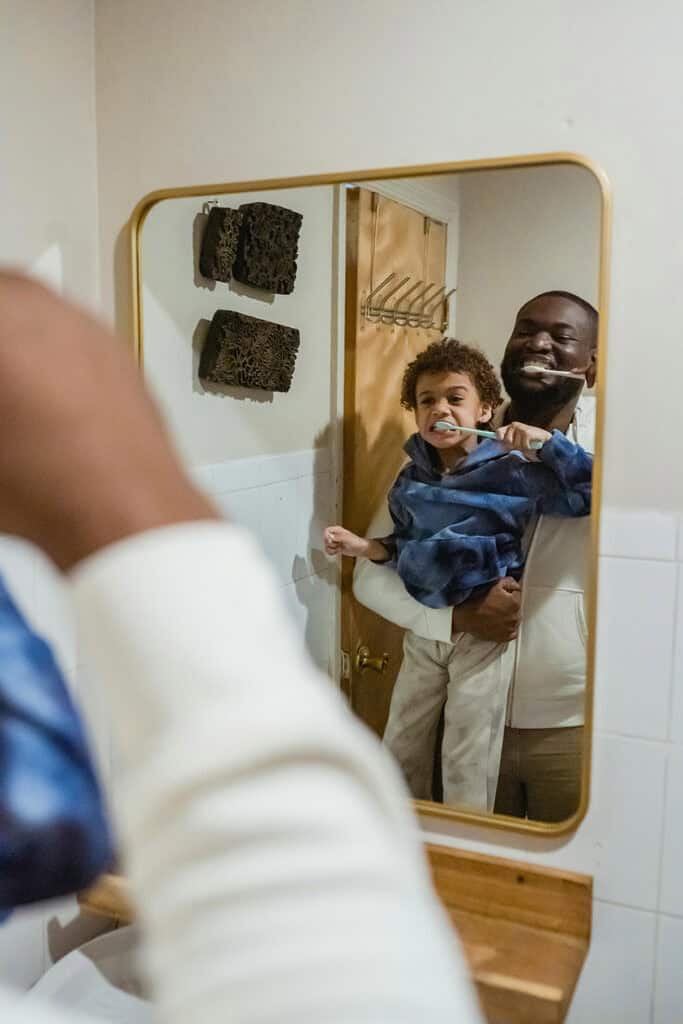

Ever wondered how you can make a lasting impact on your child’s life? As a father, balancing multiple roles can be challenging, but you’re not alone. Every dad faces the same hurdles in striving to be a role model, provider, and protector.
We understand your journey and are here to guide you with practical insights on fulfilling your responsibilities.
In this article, we’ll explore the top 10 responsibilities of a father, including being a positive role model, providing both financial and emotional support, and teaching discipline and life skills.
By following these roles, you’ll have a nurturing environment that supports your child’s growth and well-being.
Continue reading to discover how you can transform your parenting approach and make a meaningful difference in your child’s life.
Here are 10 key responsibilities of a father:
- Be a Role Model: Set a positive example through behavior and values.
- Financial Support: Provide for the family’s financial needs.
- Protect the Family: Ensure the family’s safety and security.
- Show Love and Respect: Maintain a loving and respectful relationship with the partner.
- Teach Discipline: Set expectations and guide self-control.
- Unconditional Love: Offer consistent love and support.
- Provide for the Family: Ensure both emotional and material support.
- Teach Responsibility: Encourage accountability and independence.
- Help and Motivate: Support and encourage children’s goals.
- Teach Right from Wrong: Guide children in making moral decisions.
See also Money Management for Young Adults: 10 Essential Budgeting Strategies for the Future
Father’s Role in the House

Fathers play an important role in the house, carrying numerous responsibilities that impact their kids’ lives. A good father serves as a role model, influencing future relationships and personal development.
By spending quality time with their children, dads provide emotional support and stability. The physical presence of a father is essential in teaching life skills and values.
Fathers’ roles also complement those of mothers, creating a balanced family environment. Their involvement in daily activities and responsibilities helps strong, healthy families.
Ultimately, fathers hold a crucial responsibility in shaping their children’s lives and supporting their overall well-being.
Here are the top 10 responsibilities of a father:
1. Be a Role Model for Children

Being a positive role model for children is a key responsibility for fathers. Balancing work and family life demonstrates to children the importance of work-life balance.
As parents, fathers influence their children’s behavior and overall child development through their actions and attitudes.
Effective parenting involves showing respect, kindness, and responsibility, which children observe and emulate. A father’s relationship with the mother and other family members sets a standard for how healthy relationships should function.
As a child grows, seeing their father as a positive role model helps shape their values and attitudes, ultimately contributing to their success and well-being. Fathers play a crucial role in nurturing and guiding their children toward becoming responsible adults.
6 Tips on How to Be a Good Role Model as a Father
- Support Their Interests: Encourage and support your children’s hobbies and interests.
- Show Respect: Treat everyone, especially family members, with respect and kindness.
- Communicate Effectively: Engage in open and honest communication with your children.
- Lead by Example: Exhibit positive behaviors and attitudes that you want your children to emulate.
- Be Involved: Participate actively in your children’s lives, from school events to daily routines.
- Stay Positive: Maintain a positive outlook and handle challenges with resilience and patience.
2. Financial Support

Financial support is a fundamental responsibility for fathers, encompassing money management skills and life planning to ensure a supportive environment where children feel secure.
Beyond providing for immediate needs, it instills a sense of responsibility and teaches values like prudence and diligence.
As children grow, fathers’ roles as providers and role models become pivotal in shaping their financial attitudes and behaviors.
By fulfilling this duty, fathers not only support their families materially but also contribute significantly to their children’s overall wellness and future prospects.
3. Be a Protector of a Family
Fathers play a crucial role as protectors within the family, ensuring discipline and stability. From the moment a child is born, fathers contribute to their development by teaching values and helping relationships within the household.
This responsibility begins early, during pregnancy, and continues throughout the child’s life. By providing guidance and setting boundaries, fathers help children learn essential life skills and navigate challenges.
Their role as protectors extends beyond physical safety to emotional support and the development of strong familial bonds, creating a nurturing environment where children can thrive and grow into responsible individuals.
Here are ways to be a good protector within a family:
- Be Present: Show up consistently and actively engage in family life to build trust and connection.
- Ensure Physical Safety: Implement measures to secure the home and surroundings.
- Provide Emotional Support: Offer comfort, empathy, and encouragement during difficult times.
- Establish Boundaries: Set clear rules and expectations to maintain discipline and order.
- Teach Life Skills: Educate family members on essential skills for personal safety and well-being.
- Promote Open Communication: Help an environment where family members feel safe to express concerns.
- Be Vigilant: Stay aware of potential risks and take proactive steps to prevent harm.
- Support Personal Growth: Encourage the pursuit of interests and hobbies that promote confidence and resilience.
- Lead by Example: Demonstrate integrity, responsibility, and respect in daily actions.
- Advocate for Health: Prioritize physical and mental health by promoting healthy habits and seeking medical care when needed.
4. Show Love and Respect for the Partner

Showing love and respect for one’s partner is a fundamental fatherly responsibility that impacts future relationships and defines what it means to be a good father.
By spending quality time and being physically present, fathers exemplify their roles and teach values like respect and empathy. When children see their fathers showing love and respect to their mothers, it sets a positive example for healthy relationships.
As children grow, they learn to value these principles in their own lives, contributing to a harmonious family dynamic and helping strengthen bonds within the family unit.
Here are 10 examples of ways fathers can show love and respect for their partners:
- Surprising with thoughtful gifts
- Cooking a special meal
- Planning a date night
- Writing love notes or letters
- Offering compliments and words of appreciation
- Taking on household chores without being asked
- Listening attentively and empathetically
- Supporting their partner’s personal goals and hobbies
- Giving massages or pampering sessions
- Organizing a romantic getaway or weekend
See also How to Set Career Goals: 10 Essential Steps to Career Success
5. Teaching Discipline to Kids

Teaching discipline to kids is a vital aspect of fatherhood. Fathers play a crucial role in shaping their children’s behavior and values. By being involved in their children’s lives and demonstrating discipline with affection, fathers contribute to their overall development, personality and personal growth.
Partnering with the other parent, often the mother, ensures consistency in discipline at home and school. Fathers teach valuable lessons about responsibility and respect, preparing children for relationships and life challenges.
Through their parenting approach, fathers instill discipline while maintaining nurturing relationships, helping a balanced upbringing that equips children with essential life skills and a strong moral foundation.
Here are 8 tips for teaching discipline:
- Set Clear Expectations: Establish clear rules and expectations for behavior.
- Be Consistent: Consistency in enforcing rules helps children understand expectations.
- Use Positive Reinforcement: Acknowledge and reward good behavior to encourage positive actions.
- Provide Consequences: Consistently apply consequences for inappropriate behavior to teach accountability.
- Communicate Effectively: Use clear and calm communication to explain rules and consequences.
- Be Firm yet Loving: Discipline with firmness but also show affection and support.
- Involve Both Parents: Work together with your partner to ensure consistency in discipline.
- Teach Problem-Solving: Encourage children to find solutions and learn from mistakes.
6. Unconditional Love
Unconditional love as a father is crucial from birth, nurturing, and protecting a child’s development. It teaches them about trust and security, shaping their understanding of relationships.
Fathers who are involved from an early age play a pivotal role as a positive father figure. They listen, guide, and support, contributing to their child’s emotional and social growth.
Through their actions as a husband and a father, they exemplify respect and empathy. This bond helps a strong foundation that many fathers carry into raising their children, ensuring they feel loved and valued in a sometimes uncertain world.
7. Be a Provider of a Family
As a father, being a provider for the family involves more than financial support. It entails fulfilling the role of a nurturer and guide, spending quality time with children to help their development.
Dads complement the nurturing roles of mothers, teaching important life lessons and values. Beyond monetary contributions, fathers contribute to their children’s emotional and social development, guiding them through challenges and celebrating achievements.
By actively participating in parenting responsibilities, fathers create a balanced environment where children feel supported and loved, setting a foundation for their future success and well-being.
8. Teach Taking Responsibilities

Teaching children to take responsibility is crucial for child development. Fathers can start by involving their children in a weekly chores list tailored to their age, helping a sense of duty and independence.
By assigning chores for teenagers, fathers teach their children essential life skills and contribute to their overall development. In this process, fathers play a pivotal role alongside mothers in shaping responsible behavior and work ethics.
This engagement helps children understand the importance of contributing to the household and prepares them for adulthood, ensuring they grow into capable and conscientious individuals.
Here are 10 examples of responsibilities fathers can teach their children:
- Organize Schoolwork: Managing and organizing school supplies and homework.
- Clean Their Room: Keeping their bedroom tidy and organized.
- Do Laundry: Learning to wash, fold, and put away clothes.
- Set the Table: Helping to set and clear the table during meals.
- Feed Pets: Taking responsibility for feeding and caring for pets.
- Take Out the Trash: Gathering and disposing of household garbage.
- Do Dishes: Washing dishes and cleaning up after meals.
- Make Their Bed: Making their bed daily.
- Water Plants: Caring for indoor and outdoor plants.
- Keep Track of Belongings: Being responsible for personal items.
9. Help kids and Motivate them

A father plays a crucial role in helping and motivating his children. By spending quality time together, dads provide emotional support and guidance, helping a strong parent-child bond.
Fathers encourage their children to explore the world, offering valuable perspectives and lessons. They listen attentively to their kids’ concerns, aiding in their development and confidence.
Fathers also share responsibilities with mothers, ensuring a balanced upbringing. In the school environment, dads motivate children to excel academically and socially.
Ultimately, a father’s involvement is vital in shaping his children’s character and preparing them for life’s challenges with resilience and determination.
10. Teach Children Right from Wrong
Teaching children right from wrong is a fundamental responsibility of fathers in parenting. From an early age, involved fathers play a crucial role in the development of their children’s moral compass.
By listening and engaging actively, dads contribute to their children’s understanding of ethical behavior and decision–making. This guidance helps in raising well-rounded individuals who respect others and themselves.
Fathers complement mothers in parenting, helping a balanced approach to learning values and navigating relationships. Through consistent involvement and positive reinforcement, fathers establish strong foundations for their children’s growth and development into responsible adults.
Here are 8 tips for fathers on teaching children right from wrong:
- Communicate Clearly: Discuss values and the reasons behind right and wrong.
- Listen Actively: Understand your child’s perspective and concerns.
- Set Clear Expectations: Establish rules and consequences for behavior.
- Provide Consistent Guidance: Offer steady support and reinforcement.
- Encourage Empathy: Teach children to consider others’ feelings and perspectives.
- Use Positive Reinforcement: Acknowledge and praise good behavior.
- Correct Gently: Address misbehavior calmly and constructively.
- Discuss Real-World Examples: Use everyday situations to illustrate moral lessons.
See also Personal Growth Checklist: 6 Roadmaps to Self-Improvement and Growth
Top 10 Responsibilities of a Father: A Recap
The top responsibilities of a father are pivotal in shaping children’s lives and helping their development. From birth, a father’s role extends beyond providing to actively raising and nurturing their children.
It’s essential for dads to spend quality time, teaching and guiding their kids alongside moms. Fathers play a crucial role in instilling values, teaching right from wrong, and developing healthy relationships.
Through their involvement, children learn essential life lessons and witness firsthand the importance of a father’s influence.
This partnership between parents is key to creating a supportive environment where children thrive emotionally, socially, and intellectually under the guidance and care of both mother and father.


